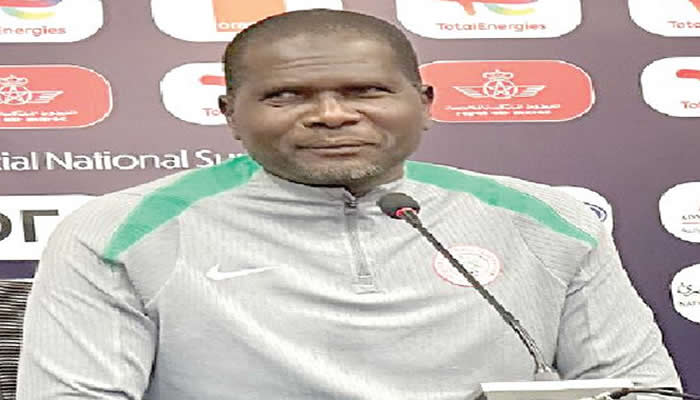Nigeria’s U-20 national football team, the Flying Eagles, secured their spot in the 2025 FIFA U-20 World Cup after finishing third at the U-20 Africa Cup of Nations (AFCON) held in Egypt. While the team celebrated their qualification, their performance during the AFCON exposed a significant weakness: a lack of attacking prowess. Throughout the tournament, the team struggled to convert their possession and dominance into goals, scoring only four goals from open play. Their highest-scoring match was a 2-2 draw against Kenya, highlighting the inconsistency and challenges they faced in the final third. Coach Aliyu Zubairu, who recently resigned from his position with El-Kanemi Warriors in the Nigeria Professional Football League (NPFL), has acknowledged this deficiency and pledged to address it before the World Cup kicks off in Chile.
Zubairu’s awareness of the team’s attacking struggles indicates a proactive approach towards improvement. He recognizes that despite often controlling matches and creating opportunities, the Flying Eagles lacked the clinical finishing required to translate their efforts into goals. This weakness was a consistent theme throughout the AFCON campaign, preventing the team from achieving a higher finish. Now, with the World Cup looming, Zubairu’s focus is sharply directed towards enhancing the team’s attacking efficiency. The challenge lies not in creating chances, but in capitalizing on them, a task that requires a combination of tactical adjustments, individual player development, and potentially integrating new talent into the squad.
The draw for the 2025 U-20 World Cup has placed the Flying Eagles in Group F, alongside Colombia, Norway, and Saudi Arabia. This group presents a varied set of challenges, with each team possessing unique strengths and playing styles. Colombia, traditionally a strong South American side, will test the Flying Eagles’ defensive resilience and tactical flexibility. Norway, known for their physicality and organized play, will demand discipline and strategic awareness. Saudi Arabia, a rapidly improving footballing nation, will bring a blend of technical skill and tactical astuteness. Navigating this group will require the Flying Eagles to be at their best in all aspects of the game, particularly in their ability to convert opportunities into goals.
The Flying Eagles’ opening match against Norway on September 29th will set the tone for their World Cup campaign. A positive result in this crucial first game will build confidence and momentum for the subsequent matches against Saudi Arabia on October 3rd and Colombia on October 6th. The team’s success in the group stage hinges on their ability to find a consistent rhythm in attack, capitalize on set pieces, and maintain defensive solidity. The coaching staff will likely focus on developing specific game plans for each opponent, taking into account their strengths and weaknesses, and emphasizing the importance of disciplined and cohesive team play.
Nigeria has a proud history in the U-20 World Cup, having reached the final twice, in 1989 and 2005. In the 1989 tournament, they were narrowly defeated by Portugal in a thrilling final, showcasing the nation’s emerging talent on the global stage. Their second appearance in the final, in 2005, saw them face a formidable Argentina side led by a young Lionel Messi. Despite a valiant effort, the Flying Eagles ultimately fell short, but the experience further solidified their reputation as a force to be reckoned with in youth football. These past performances serve as both inspiration and a benchmark for the current squad, reminding them of the potential for success on the world stage.
However, more recent history presents a stark reminder of the challenges that lie ahead. In the 2023 U-20 World Cup held in Argentina, the Flying Eagles were eliminated in the round of 16 by South Korea. This early exit underscored the competitive nature of the tournament and the need for consistent high-level performance. The lessons learned from this experience will undoubtedly be invaluable as the team prepares for the 2025 edition in Chile. The coaching staff will emphasize the importance of mental fortitude, tactical discipline, and the ability to adapt to different playing styles and conditions. The goal is not just to qualify for the World Cup but to make a deep run and, ideally, surpass the achievements of previous generations.


